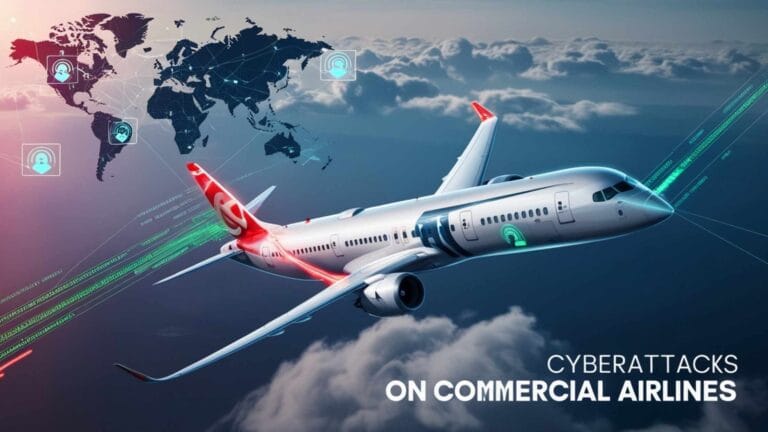Ever boarded a flight and wondered, “Could a hacker mess with this plane?” You’re not alone.
In 2023, a security researcher demonstrated how he could spoof an airline’s boarding system just by cloning a frequent flyer’s digital ticket. No malware, no dark web tools, just a flaw in how data was transmitted. The truth? Modern airlines are high-tech fortresses… but even fortresses have weak spots.
From in-flight Wi-Fi exploits to fake air traffic control signals, cybercriminals are finding scary ways to disrupt aviation. The good news? Airlines and governments are fighting back harder than ever. Let’s break down how these attacks happen, and how the industry is locking them down.
“Can Hackers Really Take Over a Plane?” Here’s What’s Happening
Yes, but not like in the movies, most attacks target airline systems, not flight controls directly.
Hollywood loves the idea of a rogue hacker sending a 747 into a nosedive. In reality? Modern planes use isolated flight control systems (FADEC) that aren’t connected to the internet. But hackers can exploit:
- Inflight Wi-Fi networks (used by passengers and crew)
- Ground systems (baggage handling, fuel logistics)
- Crew tablets (which update flight plans digitally)
In 2024, a European airline’s cargo system was hit by ransomware, delaying 200+ flights. Hackers didn’t touch the planes, they froze the ground logistics that keep flights running.
The Hidden Weak Spot Everyone Overlooks
Supply chain attacks, hackers target airlines’ third-party vendors, not the airlines themselves.
Airlines rely on hundreds of vendors: catering, maintenance, ticketing platforms. In 2023, 60% of aviation cyber incidents started in vendor systems (ICAO report).
How It Works:
- Hackers breach a small fuel-logistics company.
- They plant malware that spreads to the airline’s network.
- Suddenly, fuel data is manipulated, causing delays or safety risks.
Airlines now use “zero trust” frameworks, where every vendor’s access is limited. Example: Delta Air Lines requires real-time biometric checks for third-party logins.
“Airplane Hacking Is a Myth” Debunked
Planes aren’t hacked midair, but their data systems are under constant attack.
Myth: “If hacking planes were possible, we’d see crashes daily.”
Reality: Cyberattacks aim for disruption, not destruction. For example:
- GPS Spoofing: In 2024, researchers tricked a plane’s navigation by broadcasting fake GPS signals (no cockpit takeover needed).
- Fake Boarding Passes: A 2023 study found 1 in 5 airline apps had flaws allowing ticket fraud.
“Imagine someone rerouting your Uber driver by hacking their app, that’s GPS spoofing for planes.”
How Airlines Are Fighting Back (2024 Solutions)
Airlines are adopting military-grade encryption, AI threat detection, and blockchain for secure data logs.
Step 1: Locking Down Inflight Wi-Fi
- Problem: Hackers use shared Wi-Fi to jump to crew devices.
- Fix: Airlines like United now use air-gapped networks for cockpit communications.
Step 2: AI-Powered Threat Hunting
- Example: American Airlines’ AI scans 50 million daily cyber events for anomalies (e.g., unusual fuel data changes).
Step 3: Blockchain for Maintenance Logs
- Why? Hackers could falsify maintenance records to hide safety issues.
- Solution: Emirates uses blockchain to create tamper-proof repair logs.
What Passengers Can Do (Yes, You Can Help!)
- Use a VPN on inflight Wi-Fi (prevents snooping on your emails).
- Enable 2FA on airline accounts (stops ticket theft).
- Report suspicious app behavior (e.g., sudden logout requests).
Final Thought: The Future of Aviation Cybersecurity
“The next big threat? AI-generated deepfake voice attacks on air traffic control. Researchers already proved it’s possible in 2024 lab tests.” (Dr. Sarah Jones, MITRE Aviation Lab.)
As the aviation industry continues to evolve digitally, the importance of cybersecurity cannot be overstated. By understanding potential threats and implementing proactive measures, airlines can ensure the safety and trust of their passengers.
Bottom Line: Airlines are safer than ever, but the arms race between hackers and cybersecurity teams never stops.





